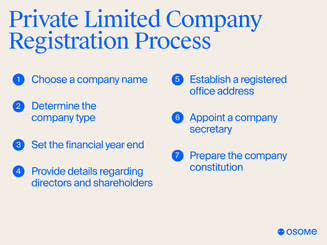Setting Up a Private Limited Company in Singapore: Advantages and Process
- Published: 18 January 2024
- 14 min read
- Starting a Company


Gabi Bellairs-Lombard
Business Writer
Gabi's passionate about creating content that inspires. Her work history lies in writing compelling website copy and content, and now specialises in product marketing copy. When writing content, Gabi's priority is ensuring that the words impact the readers. As the voice of Osome's products and features, Gabi makes complex business finance and accounting topics easy to understand for small business owners.
Considering a Singapore Private Limited Company? Learn why this business structure, with its limit on shareholder liability, is ideal for entrepreneurs and how it contrasts with other types of business entities. Our guide outlines the advantages of establishing a Singapore private limited company, the incorporation process, and the ongoing compliance for operating this kind of company, providing a clear roadmap to start and sustain your business in the region efficiently.
Key Takeaways
- In Singapore, a Private Limited Company offers limited liability protection, separation from its owners, perpetual succession, and is a recognised taxable entity, which makes it a preferred structure for scalability and credibility in business.
- Registering a Private Limited Company in Singapore is streamlined with reduced corporate tax rates and tax exemptions, particularly for startups, and the ability to raise capital through issuing shares.
- Post-registration requirements for a Private Limited Company in Singapore include holding an Annual General Meeting (AGM), filing an Annual Return, opening a corporate bank account, and obtaining necessary licenses and permits.
What Is a Private Limited Company (Pte Ltd)?
A Singapore Private Limited Company, one of the most popular business entities, is recognised for its dynamic, credible, and scalable nature, making it a well-suited structure for prospective business owners. This separate legal entity, also known as a private company, distinguishes itself from its shareholders and is viewed as a taxable entity in its own capacity. This means that the shareholders of such a limited liability company are not held personally accountable for its debts and losses beyond their investment in paid-up share capital.
The unique traits of this kind of private company include limited liability for shareholders, separation from its owners, and its status as a recognised taxable entity, all of which contribute to its potential for scalability and credibility. This structure provides an excellent platform for growth, expansion prospects, and increased credibility in the business landscape.

Key characteristics
As a separate legal entity, a Singapore Private Limited Company can enter into contracts, employ personnel, and hold assets under its own distinct legal identity. Once incorporated, the company receives a company business profile (which includes the company name and registration number) and a Unique Entity Number (UEN). Shareholders in a Private Limited Company enjoy liability protection, which safeguards their personal assets from business debts and liabilities. Shareholders are liable only to the extent of their capital investment.
Furthermore, perpetual succession ensures the ongoing existence of the Private Limited Company, regardless of changes in its shareholders or directors. This lends a sense of stability and enduring presence to the company. The Inland Revenue Authority of Singapore also offers tax incentives for Private Limited Companies, including reduced corporate tax rates and tax exemptions.
Comparison with other business structures
While a Private Limited Company stands as a separate legal entity, offering shareholders liability protection, apartnership does not afford the same luxury. Partners in a partnership may be personally liable for the business’s debts and obligations. Also, while partners possess and directly manage the business in a partnership, shareholders in a Private Limited Company own the company but may not necessarily manage it.
In the realm of taxation:
- Sole proprietors are subject to personal income tax on their business profits
- Pte Ltds are taxed at a corporate tax rate of 17%
- Partnerships don’t incur separate taxation. Partners are instead taxed individually on their share of the profits.
A Singapore Private Limited Company can benefit from its separate legal entity status, which allows it to raise capital by selling shares. This is a capability not available to sole proprietorships.
Why Should You Incorporate a Private Limited Company?
A business owner seeking to form a holding or offshore company will benefit significantly from the Private Limited Company structure as it will exist as its own legal identity. The high ranking of Singapore in the Ease of Doing Business Index signifies the efficiency of incorporating and operating businesses within the country.
Establishing a Private Limited Company is a great option for starting a business in Singapore. It provides various benefits such as limited liability, perpetual succession, and tax advantages that make it an attractive choice for both locals and foreigners.
Advantages of Operating a Private Limited Company in Singapore
The benefits of incorporating a Private Limited Company under your unique company name make them appealing to entrepreneurs with big ambitions and ideas to test. One of the prominent advantages is the limited liability protection offered to its shareholders. Unlike a limited company, sole proprietorship and partnership structures (regardless if it's a general partnership or limited liability partnership) have the owners personally liable for the business, so their liability is unlimited. This ensures that shareholders are not personally accountable for the company’s debts and losses beyond their investment in share capital. As a result, their personal assets are safeguarded from company liabilities.
Tax incentives are another significant advantage for a Pte Ltd in Singapore. They can leverage reduced corporate tax rates and tax exemptions, especially beneficial for new startups and small to medium enterprises.
Additionally, generating capital for a new Singapore company is a relatively hassle-free process for Private Limited Companies in Singapore — another reason why it's a popular business structure over becoming a sole proprietor. They can issue new shares to either existing or new shareholders, typically completed within 2 to 3 working days, which facilitates the acquisition of additional funds for business expansion.

Tax incentives
The various tax exemptions and tax benefits available to Pte Ltds is possibly the biggest reason it is such a popular business structure, specifically in Singapore.
The Inland Revenue Authority of Singapore has set the applicable corporate tax rate for Private Limited Companies at 17%. However, new start-up companies in Singapore are eligible for a 75% tax exemption on the first S$100,000 of normal chargeable income for their first three consecutive years of operations.
This tax exemption for a new Singapore company essentially allows them to keep a significant portion of their profits, which is excellent for new businesses looking to grow revenues in their early years of business as they will have additional resources for growth and expansion. Furthermore, Singapore adheres to a single-tier taxation regime, ensuring that incomes taxed at the corporate level are not subject to further taxation in the hands of the shareholders.
Consequently, this leads to tax-free income for Singapore company directors, shareholders and proprietors of a Singapore company with no need to pay any capital gain tax.
Limited liability protection
Shareholders in a Singapore company can benefit from this protection, which means that they are not held personally responsible for the company's debts and losses beyond the amount they invested in share capital. This also means that their personal assets are protected from any liabilities that the company may incur. In contrast, a private company owned by a sole proprietor or two or more partners rely on personal assets to raise capital and often pays more to secure debt capital. The liability of shareholders, compared to a sole proprietor, is limited only to the amount of their share capital, whether it has been fully paid, partially paid, or not paid at all. Individual shareholders and owners have distinct personal assets that are protected. This protection helps maintain separate financial identities for individuals and businesses.
The substantial protection of shareholders’ personal assets in a Private Limited Company, a significant advantage over entities like sole proprietorships or partnerships, mitigates the risk of unlimited liability.
Fun fact: you will always know if a company has share capital if it has "Pte Ltd" attached to the end of its company name!
Ease of raising capital
A Singapore Private Limited Company can enjoy the advantage of raising capital by issuing new shares to either existing or new shareholders. A sole proprietor will struggle to do this as easily. This facilitates the acquisition of additional funds for business expansion. This share allotment process is usually efficient, and typically completed within 2 to 3 working days. This flexibility to raise capital as a newly established Singapore company facilitates business growth and expansion and introduces new investors, which can lead to new opportunities and partnerships.
Furthermore, the company directors of private companies can attract new investors and bolster their financial health and stability by:
- Networking and building relationships with potential foreign investors
- Showcasing robust business plans and growth prospects
- Investing in high-quality products and services
How To Register a Singapore Private Limited Company
Registering a Private Limited Company in this booming economic region is a straightforward process for aspiring company directors and hassle-free if you partner with a reputable corporate services provider. It necessitates specific documentation, including detailed information about specific business activities to ensure compliance and adherence to the requirements stipulated by the Accounting and Corporate Regulatory Authority (ACRA) but this is what your chosen provider for company registration assists you with. Non-residents must enlist the incorporation services of a registered filing agent, such as a corporate secretarial company (like Osome!), law firm, or accounting firm, to submit the application of the Singapore private limited company to ACRA via BizFile+ on their behalf.
The typical incorporation process takes one business day assuming all necessary documentation is in order. Following successful incorporation, the company will receive electronic versions of the business profile and Unique Entity Number (UEN) and may choose to obtain a physical copy of the certificate of incorporation if necessary.
Engaging a registered filing agent
To ensure the smooth registration of your Pte Ltd in Singapore, especially for non-residents, engaging the services of a registered filing agent is crucial and also alleviates a lot of stress and time spent on the application. These agents, authorised to deal with Singapore government agencies, handle document submission and process registration fee payments to the corporate regulatory authority (ACRA) on the company’s behalf.
Registered filing agents, such as corporate secretarial companies, law firms, or accounting firms, must meet the qualifications outlined in the ACRA (Filing Agents and Qualified Individuals) Regulations, complete mandatory training, and be a registered business entity with ACRA. By enlisting their services, you can streamline the process of establishing your company in Singapore, ensuring that all legal formalities are met.
Required documents and information
Numerous requirements must be met to register a Private Limited Company in Singapore. These requirements must be met in order to establish the company successfully. These include:
- Choosing a company name
- Outlining specific business activities
- Determining the company type
- Setting the financial year-end
- Providing details of at least one shareholder
- Establishing a registered office address
- Appointing a company secretary
- Preparing the company constitution
The company constitution holds significance as it delineates its governing framework, specifying the relationship between shareholders and establishing their rights and obligations in the business activities. It plays a crucial role in safeguarding shareholder interests and upholding control by the company’s founders. Also, the registered address must be a physical location where the company receives official correspondence, as a P.O. Box is not accepted. In certain circumstances, residential addresses may be used.
Submission and approval process
The submission and approval process can begin once all the necessary documents are gathered. The approval process for a Pte Ltd in Singapore generally ranges from a few hours to 1 day, although it could extend to 2 months if the application requires referral to another agency for approval or review. Non-compliance with the requirements or errors in the application could lead to a delay in the approval process of the Singapore Private Limited Company.
Despite the potential complexities, the registration process can be expedited by engaging service providers to optimise and hasten the registration process. This can be especially beneficial for those situated abroad aspiring to take advantage of the many attractions that come with running a business in Singapore.
The entire submission and approval process for Private Limited Company registration can be conducted from abroad, allowing international entrepreneurs to establish their business entity without the need to be physically present in Singapore. The process is effortless, which is why there is such a high presence of foreign-owned businesses in the country — once the business owner receives an approval email for their corporate entity and a company business profile, they are free to proceed with all other requirements of the registration process to get them off the ground as quickly as possible.

Post-Registration Compliance and Requirements
Following the successful Private Limited Company registration, there are several post-registration compliance requirements to meet. These include:
- Organising an Annual General Meeting (AGM) within six months of the fiscal year-end.
- Filing an Annual Return within 30 days following the AGM.
- Completing financial statements submission within seven months of the fiscal year-end.
Additionally, you will need to:
- Open a corporate bank account for your business
- Ensure that the registered address is a physical location where the company receives official correspondence. Note that a P.O. Box is not acceptable.
- In certain circumstances, residential addresses may be used
- Ensure up-to-date information on your company business profile
Lastly, certain licenses and permits may be necessary depending on the nature of your business. Failure to obtain requisite licenses or permits can lead to severe consequences, including monetary penalties, disqualification, and potential business closure. This is in accordance with the Singapore Companies Act and is a legal obligation of all businesses that require permits to operate.
Annual General Meetings (AGMs) and Annual Returns (ARs)
The annual compliance obligations for Private Limited Companies in Singapore include holding annual general meetings and filing annual returns. Following Private Limited Company registration, business owners in Singapore must conduct their Annual General Meeting (AGM) within four months following the end of their financial year.
Neglecting to comply with the AGM requirements may lead to legal prosecution, potential disqualification or debarment from directorship, and imposition of composition fines by ACRA. In the event of conviction, directors may face fines of up to a maximum of $5,000 per charge.
Corporate bank account
As a distinct legal entity, a Pte Ltd in Singapore must possess a corporate bank account to conduct business transactions. Singapore provides a range of banking options for corporate bank accounts, encompassing traditional banks like DBS, UOB, and OCBC, as well as digital banks and neobanks, such as Aspire. Here at Osome, we are proud partners with multiple mainstream and digital banks in Singapore — we can help choose the best account for your business's needs.
To establish a corporate bank account, you need to provide the following documents:
- Certified True Copies of the Company’s Constitution
- Passport (or Singapore IC) and Residential Address Proof of the Directors, Signatories, and Ultimate Beneficiary Owners
- Board resolution indicating the appointment of signatories
Licenses and permits
Certain licenses and permits may be necessary depending on the nature of your business. Failure to obtain the requisite licenses or permits for operating a Pte Ltd in Singapore can lead to severe consequences, including monetary penalties, disqualification, and potential business closure.
The nature of the business determines the required licenses and permits, which should be outlined when you submit your company name during the private limited company registration process. Obtaining the necessary licenses and permits in Singapore can vary in duration, typically ranging from two weeks to two months, depending on the specific type of license or permit needed.
Tips for Successfully Running Your Private Limited Company
Effective management and careful planning are required to run a Private Limited Company in Singapore. Financial management is crucial to the success of your company. This includes:
- Enhancing the invoicing process
- Engaging in negotiations with vendors
- Closely monitoring expenses
- Adjusting prices as needed
- Closely monitoring financial performance
- Utilising accounting software
- Appointing a local Company Secretary to manage compliance obligations
Ensuring legal compliance is another vital aspect of managing this corporate entity in Singapore. This includes:
- Maintenance of accurate corporate registries
- Organisation of an Annual General Meeting within six months of the fiscal year-end
- Filing of an Annual Return within 30 days following the AGM
- Completion of financial statements submission within seven months of the fiscal year-end
Many Singapore companies choose to seek professional guidance to help streamline the management of their finances and compliance. Professional accounting businesses, such as Osome, can provide expert advice, offer comprehensive business support, and aid in managing multiple operational areas of the company. This can streamline the formation process, provide expert advice, offer comprehensive business support, and aid in managing multiple operational areas of the company. Over 10, 000 Singapore companies have trusted us with their company registration, company secretary and accounting services, serving as their partners in business growth. Get in touch with our team of experts if you want to become one of them!
Financial management
Competent financial management is vital for ensuring the organisation’s sustainability. It forms the foundation for:
- Fiscal governance
- Strategic planning
- Identification of financial requirements
- Financial reporting
- Record-keeping
- Capital budgeting to assess profitability and inform investment decisions.
Furthermore, an exempt private company, which is a different type of Private Limited Company in Singapore, can effectively plan its taxes by gaining a comprehensive understanding of local tax laws and identifying relevant tax exemptions and reliefs. This can lead to a significant reduction in the tax burden, particularly for new companies that are leveraging Singapore’s tax exemptions.
Legal compliance
Observance of the legal frameworks governing corporate governance of Private Limited Companies in Singapore, including the Singapore Companies Act, is of paramount importance. The primary regulatory bodies for Private Limited Companies in Singapore are the Accounting and Corporate Regulatory Authority (ACRA) and the Economic Development Board (EDB).
Failure to comply with the Companies Act as a Private Limited Company in Singapore may lead to penalties, including fines not exceeding $10,000 or imprisonment for a term not exceeding 2 years. Additionally, there are late lodgement fees ranging from S$50 to S$350 for delayed submission of documents.
Seeking professional services
Professional assistance can bring significant benefits to a private limited company, including:
- Streamlining the formation process
- Providing expert advice
- Offering comprehensive business support
- Aiding in the management of various operational areas.
Corporate service providers in Singapore offer a variety of services to Private Limited Companies, which include:
- Registration and renewal for filing agents and qualified individuals
- Making changes to company details
- Providing business support services such as tax accounting, company incorporation, and legal assistance.
Legal advisors can offer assistance to Private Limited Companies in Singapore by providing legal advice and guidance on various matters, protecting the company’s interests and ensuring legal compliance.
Summary
In conclusion, setting up a Private Limited Company in Singapore offers numerous advantages, including tax incentives, shareholders liability protection, and ease of raising capital. While the registration process requires careful planning and adherence to specific regulations, the benefits outweigh the challenges. By ensuring proper financial management, and legal compliance and seeking professional assistance, you can successfully run your Private Limited Company in Singapore.
FAQ
What is a private limited company in Singapore?
A private limited company in Singapore is a limited liability company with less than 50 shareholders whose shares are not available to the general public. Most privately incorporated businesses in Singapore fall under this category, and their names typically end with "Private Limited" or "Pte Ltd."
What is the difference between an Ltd and a Private Ltd?
The main difference between an LTD and a private LTD is that a public LTD company has shares freely traded on the stock exchange, while a private LTD company has fewer shareholders, often friends or relatives, and is smaller in nature and operations. This can provide more clarity on their structures and operations.
What is a private company vs a Public Ltd?
Shareholders own a public limited company (Pte Ltd) and allow members of the public to purchase stock, while a private limited company (Ltd) does not publicly trade shares and is limited to a maximum of 50 shareholders.
What is the corporate tax rate for private limited companies in Singapore?
The corporate income tax rate for private limited companies in Singapore is 17%. This differs from an individual income tax rate of 20% (maximum) if you are self-employed.
What are the annual compliance requirements for Private Limited Companies in Singapore?
Private Limited Companies in Singapore must fulfil annual compliance obligations, such as holding annual general meetings and filing annual returns. If you're a foreigner, submit your company secretary details to represent your business and ensure legal compliance on the ground so that you have peace of mind offshore.
What are the costs of setting up a private limited company in Singapore?
The costs of setting up a private limited company in Singapore typically include an incorporation fee (ranging from S$300 to S$1,200), a name reservation fee (S$15 per name reservation), a business registration fee (S$100), and the potential expenses of a registered office address (annual fees of S$300 to S$800 or more), a company secretary (annual fees of S$300 to S$800), and other possible expenses like company seals or additional licenses and permits. The exact costs can vary based on specific requirements, service providers, and any additional licenses needed for specific business activities.
Get expert tips and business insights
By clicking, you agree to our Terms & Conditions, Privacy and Data Protection PolicyWe’re using cookies! What does it mean?






